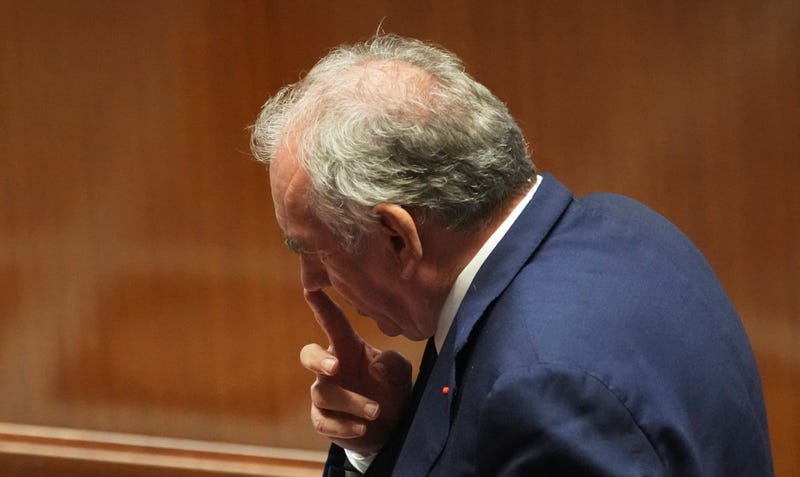
PARIS (AP) — Legislators toppled France’s government in a confidence vote on Monday, a new crisis for Europe’s second-largest economy that obliges President Emmanuel Macron to search for a fourth prime minister in 12 months.
Prime Minister François Bayrou was ousted overwhelmingly in a 364-194 vote against him. Bayrou paid the price for what appeared to be a staggering political miscalculation, gambling that lawmakers would back his view that France must slash public spending to rein in its debts. Instead, they seized on the vote that Bayrou called to gang up against the 74-year-old centrist who was appointed by Macron last December.
The demise of Bayrou’s short-lived minority government — now constitutionally obliged to submit its resignation after just under nine months in office — heralds renewed uncertainty and a risk of prolonged legislative deadlock for France as it wrestles with pressing challenges, including budget difficulties and, internationally, wars in Ukraine and Gaza and the shifting priorities of U.S. President Donald Trump.
Hunt for a replacement
Although Macron had two weeks to prepare for the government collapse after Bayrou announced in August that he’d seek a confidence vote on his unpopular budget plans, no clear front-runner has emerged as a successor.
After Gabriel Attal’s departure as prime minister in September 2024, followed by former Brexit negotiator Michel Barnier’s ouster by parliament in December and Bayrou now gone, too, Macron again is hunting for a replacement to build consensus in the parliament’s lower house that is stacked with opponents of the French leader.
Macron's office said that he'd accept the resignation of Bayrou's government on Tuesday and name a new prime minister “in the coming days.”
As president, Macron will continue to hold substantial powers over foreign policy and European affairs and remain the commander in chief of the nuclear-armed military. But domestically, the 47-year-old president’s ambitions are increasingly facing ruin.
The root of the latest government collapse was Macron’s stunning decision to dissolve the National Assembly in June 2024, triggering a legislative election that the French leader hoped would strengthen the hand of his pro-European centrist alliance. But the gamble backfired, producing a splintered legislature with no dominant political bloc in power for the first time in France’s modern republic.
Shorn of a workable majority, his minority governments have since lurched from crisis to crisis, surviving on the whim of opposing political blocs on the left and far-right that don’t have enough seats to govern themselves but can, when they team up, topple Macron’s choices.
Bayrou's gamble
Bayrou, too, rolled the dice by calling the confidence vote, a decision that quickly backfired on the political veteran as left-wing and far-right legislators seized the opportunity to oust him, seeking to increase pressure on Macron.
Bayrou conceded in his last speech as prime minister to the National Assembly that putting his fate on the line was risky. But he said that France’s debt crisis compelled him to seek legislative support for remedies, in the face of what he called “a silent, underground, invisible, and unbearable hemorrhage” of excessive public borrowing.
“The greatest risk was to not take one, to let things go on without changing anything, to go on doing politics as usual,” he said. “Submission to debt is like submission through military force. Dominated by weapons, or dominated by our creditors, because of a debt that is submerging us — in both cases, we lose our freedom.”
At the end of the first quarter of 2025, France’s public debt stood at 3.346 trillion euros, or 114% of gross domestic product. Debt servicing remains a major budget item, accounting for around 7% of state spending.
Le Pen wants new election
The 577-seat National Assembly interrupted its summer recess to convene for the extraordinary session of political drama. Macron’s opponents worked to leverage the crisis to push for a new legislative election, pressure for Macron’s departure or jostle for posts in the next government.
Far-right leader Marine Le Pen called for Macron to again dissolve the National Assembly, seemingly confident that her National Rally party and its allies would win a majority in another snap legislative election, positioning it to form a new government.
“A big country like France cannot live with a paper government, especially in a tormented and dangerous world,” she said.
Pressing problems
In a last-ditch effort to save his job before the vote, Bayrou warned that France is risking its future and its influence by racking up trillions in debts, pleading for belt-tightening.
Macron’s chosen replacement will operate in the same precarious environment and face the same pressing budget problems. Under the French political system, the prime minister is appointed by the president, accountable to the parliament and is in charge of implementing domestic policy, notably economic measures. Macron himself has vowed to stay in office until the end of his term in 2027, but risks becoming a lame duck domestically if political paralysis continues.
Arguing for sharp cuts to repair public finances, Bayrou had proposed to slashing 44 billion euros ($51 billion) in spending in 2026, after France’s deficit hit 5.8% of GDP last year, way above the official EU target of 3%.
Speaking in the National Assembly, he painted a dramatic picture of France becoming beholden to foreign creditors and addicted to living beyond its means — problems that he warned would outlast his government without remedial action.
“You have the power to overthrow the government, but you do not have the power to erase reality,” Bayrou told lawmakers. “Reality will remain inexorable. Spending will continue to increase and and the debt burden — already unbearable — will grow heavier and more costly.”